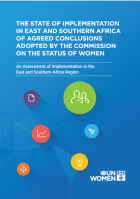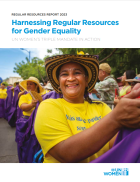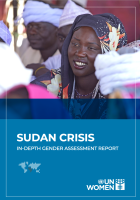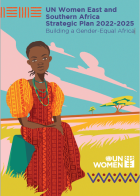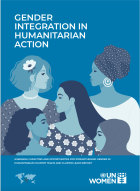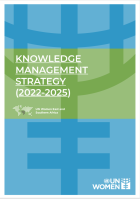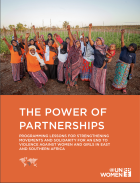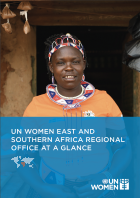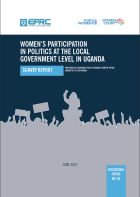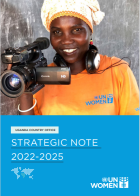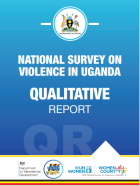1 - 20 of 33 Results
Pagination
Date:
The Commission on the Status of Women (CSW) monitors gender equality commitments and the Beijing Declaration. A study by UN Women East and Southern Africa assessed CSW63–CSW66, finding strong treaty ratification but weak policy implementation. Challenges include inadequate funding, weak national preparations, and limited African influence in CSW negotiations. Recommendations include strengthening coordination, enhancing stakeholder engagement, and improving CSO participation to boost Africa’s impact in global gender equality discussions.
Date:
Generation Equality is a global initiative that aims to drive change through a multigenerational and multi-stakeholder approach, focusing on key issues like equal pay, fair distribution of unpaid care work, eradicating gender-based violence, healthcare access, and increasing women’s political participation.
Date:
The UN Women Kenya Annual Report highlights key achievements in advancing women’s empowerment and gender equality.
This report showcases progress in increasing women’s leadership and political participation, strengthening economic empowerment, eliminating violence against women and girls, engaging women in peace and security efforts, and enhancing planning and coordination.
UN Women Kenya remains dedicated to building a future where women are at the heart of developing resilient and sustainable communities.
Date:
The report demonstrates how regular resources are invested to advance integrated triple mandate results. This includes explicit recognition of the expertise and leadership of UN Women staff, which relies on regular resources investments. Country, regional, and global examples illustrate how regular resources, often together with other resources, build momentum in synergy to deliver important advancements for women and girls.
Date:
The United Nations Country Team System-Wide Action Plan (UNCT-SWAP) on Gender Equality Scorecard is an accountability framework that promotes improved planning, coordination, programming, and results for Gender Equality and Women Empowerment at the country level, tied to support for Member States in achieving the Sustainable Development Goals.
Date:
This brief emerges from the UN Women East and Southern Africa Knowledge Management Strategy 2022-2025. In the period of the Strategic Note (2018-2021), ESARO leveraged its knowledge management (KM) strategy (2018-2021) and developed KM tools and systems and ensured a systematic approach to KM implementation across the region.
Date:
This Regional Coordination Strategy articulates how UN Women will leverage its unique triple mandate—encompassing normative support, UN system coordination, and operational activities—to mobilize urgent and sustained action to achieve gender equality and the empowerment of all women and girls and support the achievement of the 2030 Agenda.
Date:
The assessment utilized the gender inequality framework used in humanitarian settings. The framework considered how the gender inequalities prevalent in pre-conflict contexts are exacerbated by conflict dynamics and how the impact differs with different gender roles. The framework indicates that the humanitarian responses should consider the basic livelihood needs and investigate and address some strategic issues that promote
Date:
This Report presents the Africa Shared Research Agenda (ASRA) for ending gender-based violence (GBV), which was developed though a collaboration between UN Women Africa and the Sexual Violence Research Initiative. The ASRA is a set of research priorities for the field, developed through a participatory and consultative process and aims to inform investments in research over the coming 5-10 years for ending GBV in Central, East, Southern and West Africa.
Date:
This new strategic plan takes effect amid the global COVID-19 pandemic and accelerating climate crisis, which has disproportionately impacted women and girls and exacerbated all aspects of gender inequalities. It is clear that bold actions and increased financing are needed to rebuild better and equal, with the needs of women and girls at the heart of all we do, leaving no one behind.
Date:
The assessment focused on HCTs and Cluster Working Groups (CWGs) in recognition of the central role they play in planning and coordinating humanitarian responses. Survey findings showed that the overall knowledge of Gender integration in Humanitarian Action (GiHA) was average, with just over half of the HCTs and Clusters
reporting a working knowledge and only one third (33 percent HCTs and 25 percent clusters) reporting comprehensive knowledge.
Date:
Key initiatives in the ESA KM Strategy (2022-2025) include sustaining the review and update of country gender equality profiles by all the 13 countries in the region, increasing momentum on the use of established KM systems and tools; institutional learning; quantitative and qualitative research and analyses on GEWE; capacity strengthening for R/M/COs on KM interventions; quality assurance processes of knowledge products; evidenced based advocacy and documentation and development and repackaging of knowledge products.
Date:
This report presents the findings and recommendations from UN Women’s qualitative research on joint initiatives for ending violence against women and girls (EVAWG) implemented between 2016-2022 in East and Southern Africa (ESA).
Date:
UN Women is the UN agency mandated to promote gender equality and empowerment of women. In the East and Southern Africa Region, the organization has a presence in 13 Countries (Burundi, Ethiopia, Kenya, Malawi, Mozambique, Multi/Country Offices South Africa, Rwanda, Somalia, South Sudan, Sudan, Tanzania, Uganda, Zimbabwe). In countries where there is no presence, UN Women collaborates with the resident coordinator's office to advance gender equality.
Date:
Uganda's NAP Ill WPS 2021 - 2025 aims at ensuring sustained peace and security through enhanced meaningful participation of women in peace and development processes. The NAP I provides a strategic framework, through the WPS agenda, to mainstream UNSCR 1325 into national development and peace strategies, with the focus on strengthening the effective roles of women in the achievement of long-lasting peace in Uganda (MGLSD, 2021). Specifically, Uganda's NAP Ill aims to: Prevent all forms of violence and promote peace within families, communities and the nation; Promote meaningful participation of women in leadership and governance at all levels; Strengthen the capacity of women to mitigate and prevent natural and human-made disasters; and strengthen the institutional and coordination mechanism for WPS agenda at all levels.
Date:
This report presents the progress in the implementation of the SDGs in Uganda as of the end of 2021. It specifically provides a detailed analysis of the SDGs implementation progress as of the end of 2021; reviews the progress made on the implementation of the six recommended actions in the 2020 Voluntary National Review Report, and brings together the latest data and highlights progress made on SDGs regarding coordination, implementation, monitoring, and reporting at national and local government levels
Date:
The study was undertaken using Local Government (LG)’s election data from the Electoral Commission and survey data collected through key informant interviews with political leaders at the LG levels and focus group discussions with community people. The survey was conducted in Gulu, Nwoya, and Pader in the North; Napak, and Morotoin Karamoja sub-region; Pallisa and Bugiri in the East; and Kiryandongo in the West. Survey data was analysed using both quantitative (descriptive statistics) and qualitative techniques, which involved qualitative data from focus group discussions and open-ended survey responses from individual respondents was analysed through the following steps: transcribing the qualitative responses; pooling the transcribed responses from the various FGDs according to specific research questions; identifying the main ideas that occur in the answers to each question and creating themes; and writing narratives to describe the themes.
Date:
Uganda has made gains in its socio-economic transformation, maintained peace and stability for over 3-decades and is on course to become an upper middle-income country by 2040. The Government of Uganda (GoU) is committed to the SDG 2030 Agenda as exemplified by the gross domestic product which doubled over the last 10-years, from $17.2 billion in 2010 to $34.4 billion in 2019. Literacy rates improved from 70% between 2012-2013 to 74% between 2016-2017, yet still literacy levels were higher for males than females. Uganda’s National Development Plan (NDP) III focuses on inclusive growth, human wellbeing and resilience, transformational and inclusive governance positions. The NDPIII is a convergence framework for the entire UN System to coherently contribute to the advancement of Gender Equality and Women’s Empowerment (GEWE) in Uganda with UN Women as a strategic partner on the path to transformation
Date:
The qualitative component of the Women’s Health and Life Experiences study was designed to complement the larger survey on prevalence which seeks to generate reliable estimates of the prevalence of different forms of Violence Against Women and girls (VAWG), provide detailed information on the impacts of VAWG, and examine women’s attitudes to violence, how women cope with violence, and the risk factors associated with VAWG. It provides contextual information on women and community perspectives and experiences of Violence against women and girls (VAWG).
Date:
The Annual Report captures the work of UN Women in Zimbabwe to accelerate Gender Equality and Women's Empowerment in Zimbabwe. It highlights the organisation's initiatives, challenges and milestones achieved in 2021.

